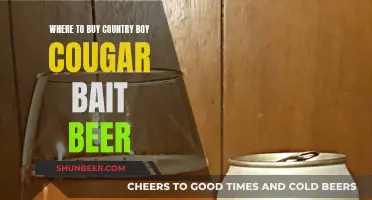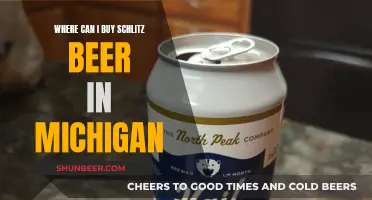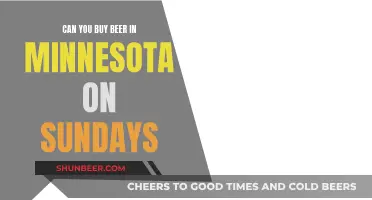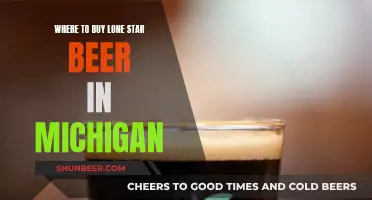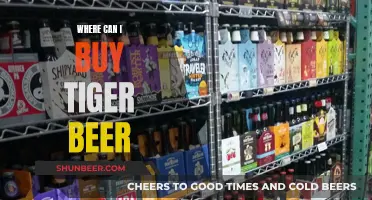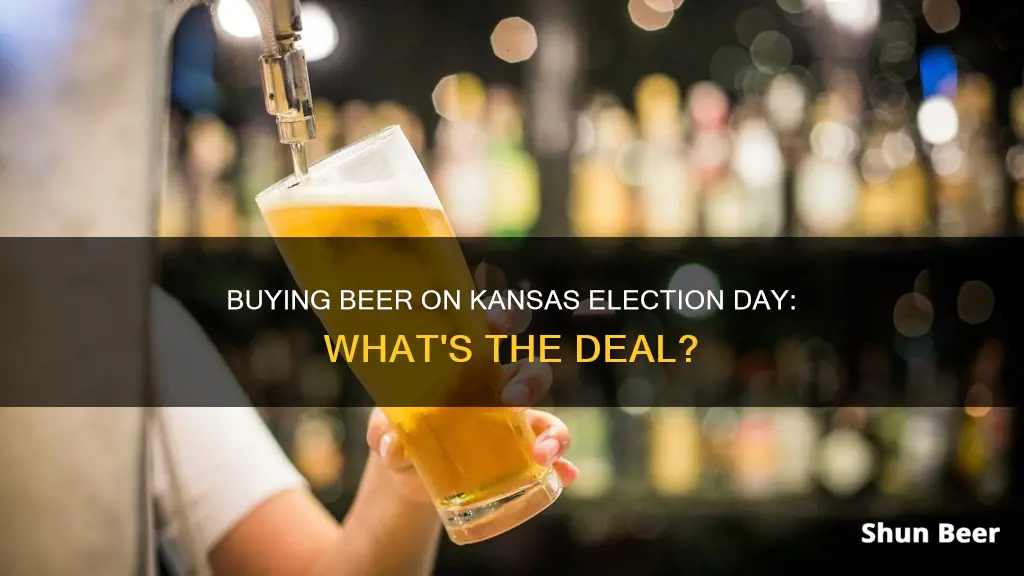
Kansas has some of the strictest alcohol laws in the United States, and its history with alcohol prohibition is well-documented. So, what about buying beer on election day? Well, it's complicated. While there are no explicit election day bans on alcohol sales in Kansas, the state's complex liquor laws mean that it depends on where you live and the type of alcohol you're buying. For example, grocery and convenience stores can only sell alcoholic beverages with up to 6% alcohol by volume, and there are different rules for cities and counties that have expanded Sunday alcohol sales. So, if you're planning to buy beer on election day in Kansas, it's best to check the local laws in your area.
What You'll Learn

Kansas's strict alcohol laws
Kansas's alcohol laws are among the strictest in the United States. The state had a long period of prohibition, lasting from 1881 to 1948, and continued to prohibit general on-premises liquor sales until 1987. The state's strict approach to alcohol is a result of its history of temperance.
Kansas was a national centre of the temperance movement in the 19th century. The movement was strengthened by the presence of Puritans in the territory, the association of the movement with the abolitionist cause, and the fact that saloons were only open to men, which led to them being seen as divisive to family life.
In 1880, Kansas voters approved an amendment to the Kansas Constitution prohibiting the manufacture and sale of "intoxicating liquors". This made Kansas the first state to enact a constitutional prohibition on alcohol. The temperance movement was led by Carrie A. Nation, who moved to Kansas in 1889 and became famous for her advocacy of the enforcement of prohibition.
In 1919, the Eighteenth Amendment to the United States Constitution was ratified, bringing in nationwide prohibition. This lasted until 1933, when it was repealed by the Twenty-first Amendment. However, Kansas still has not ratified this amendment as of 2017.
In 1937, the Kansas Legislature passed a law defining beer with an alcohol content of 3.2% or less by weight as a "cereal malt beverage" (CMB), which was excluded from the definition of "intoxicating liquor". This meant that CMB could be sold for on- and off-premises consumption.
In 1948, an amendment to the Kansas Constitution was approved, authorising the legislature to regulate, license, and tax the manufacture and sale of intoxicating liquor. However, the sale of liquor by the drink in public places (on-premises) was still prohibited. This continued until 1987, when the prohibition on open saloons was finally repealed.
Kansas law divides alcohol into six categories, each regulated differently. Alcoholic liquor includes spirits, wine, and beer containing over 3.2% alcohol by weight. Spirits include brandy, rum, whiskey, and gin, among others. A cereal malt beverage is beer containing less than 3.2% alcohol by weight, and a nonalcoholic malt beverage is beer with less than 0.5% alcohol by weight. Domestic table wine is wine containing 14% or less alcohol by volume, made by Kansas farm wineries from Kansas-grown products. Domestic fortified wine contains between 14% and 20% alcohol by volume, also made in Kansas. Domestic beer is beer containing 8% or less alcohol by weight, manufactured by microbreweries from Kansas-grown agricultural products.
Kansas has a three-tier liquor distribution system, with alcohol distributed from manufacturer to distributor to retailer. The exceptions are farm wineries and microbreweries, which can sell directly to consumers, and establishments, which can purchase beer and bulk wine directly from wholesalers.
Off-premises liquor sales are only permitted in licensed liquor stores, while grocery stores and gas stations may sell CMB. Retail liquor stores are licensed by the state, and CMB retailers are licensed by the city or county.
To become a retail liquor store licensee, an individual must be a US citizen for 10 years, a Kansas resident for 4 years, at least 21 years old, and must never have been convicted of a felony, a crime of moral turpitude, or a liquor law violation. Retail liquor stores may sell beer, wine, spirits, and nonalcoholic malt beverages.
CMB retailers must be US citizens, Kansas residents for one year, residents of the county in which the business is located for six months, at least 21 years old, and must never have been convicted of a felony in the preceding two years. CMB retailers may sell cereal malt beverages or nonalcoholic malt beverages.
In those counties that allow liquor to be sold on-premises by the drink, clubs and drinking establishments may sell beer, wine, spirits, nonalcoholic malt beverages, and CMB any day between 2 AM and 9 AM. Drinks "on the house" are prohibited, as are "all you can drink" promotions, and drinks cannot be offered as prizes. Free food and entertainment are permitted. Employees must be at least 21 years old to mix and dispense drinks, and at least 18 years old to serve.
San Miguel Beer: Where to Buy and Enjoy
You may want to see also

Kansas's history of liquor laws
Kansas has a long history of strict liquor laws, with a strong temperance movement dating back to the 19th century. The state had various factors influencing this, including an influx of Puritan immigrants, male-only saloons being seen as divisive to families, and an association with the abolitionist movement.
The temperance movement in Kansas was so strong that, in 1880, voters approved an amendment to the Kansas Constitution, prohibiting the manufacture and sale of "intoxicating liquors" from 1881. This was before the nationwide prohibition came into effect in 1919, and it lasted until 1948—longer than any other state. Kansas was the first state to enact a constitutional prohibition on alcohol. During this time, several Kansas towns, including Topeka, Emporia, and Baldwin, made the sale of alcohol at any commercial property illegal.
In 1933, the 21st Amendment to the U.S. Constitution officially repealed Prohibition, but Kansas did not ratify this amendment until much later, and it remained dry until 1948. In 1937, the state did start allowing the sale of 3.2% ABV beer, deemed "non-intoxicating" by Congress. In 1948, Kansas voted to end its statewide prohibition, and in 1949, the Kansas Alcohol Beverage Control (ABC) was created to regulate the industry. However, the "open saloon" was "forever prohibited," meaning there was no public place to consume alcohol unless it was 3.2% beer.
In 1965, the state allowed liquor sales in private clubs, and in 1979, on-premises sales of liquor by the drink in these private clubs were permitted. It wasn't until 1986 that Kansas voted to repeal the prohibition on open saloons, effective from 1987. Since then, liquor laws in Kansas have continued to evolve, with happy hours legalized in 2011, and various changes to licensing and sales regulations.
Kentucky's Beer Buying Cut-off Time Explained
You may want to see also

Alcohol sales on election day in other states
In the United States, there was a time when an age-old law banned election-day celebrations by prohibiting alcohol sales. However, as of 2014, there are no Election Day alcohol restrictions in the contiguous United States. This means that in most states, it is now perfectly legal to purchase and consume alcohol on election day.
The Election Day alcohol ban was initially established to prevent political candidates from influencing undecided voters by providing them with free-flowing liquor. Maryland was the first state to implement this law in 1811, and other states followed suit. Over the years, most states have repealed this law, with South Carolina being the last mainland state to officially roll it back in 2014.
As of 2023, only certain parts of Alaska, Puerto Rico, and some jurisdictions in Massachusetts have Election Day dry laws in place. These laws vary by municipality, so it is essential to check local regulations before purchasing alcohol on Election Day in these areas.
In addition to the United States, several countries in Latin America, including Argentina, Brazil, Chile, Colombia, Costa Rica, Ecuador, Guatemala, the Dominican Republic, Mexico, Panama, Peru, Uruguay, and Venezuela, continue to enforce strict "dry laws" or "leyes secas" on election days. These laws prohibit the sale and public consumption of alcohol before, during, and after elections, with varying durations and penalties for non-compliance.
Using Walgreens Gift Cards to Purchase Beer Legally
You may want to see also

Alcohol sales on Christmas and New Year's Day in Kansas
Kansas has some of the strictest alcohol laws in the United States, which stem from its long era of prohibition. The state prohibited the manufacture and sale of "intoxicating liquors" from 1881 to 1948, longer than any other state.
Alcohol Sales on Christmas Day in Kansas
In Kansas, sales of alcohol, beer, or wine are prohibited on Christmas Day. However, liquor stores are allowed to sell these beverages on Christmas Eve, from 9 a.m. to 8 p.m., in cities or counties where alcohol sales have been expanded on Sundays. Grocery and convenience stores with a license to sell alcohol can also sell alcoholic beverages on Christmas Eve but are limited to those with up to 6% alcohol by volume.
Alcohol Sales on New Year's Day in Kansas
While there is no specific mention of New Year's Day, it seems that the same rules apply as for Christmas. This is because, in 2023, Christmas Day and New Year's Day both fell on Mondays, following a Sunday. So, alcohol sales would be permitted on New Year's Eve (Sunday) in cities or counties with expanded Sunday sales, and prohibited on New Year's Day (Monday).
Buying Beer at CVS in Maryland: Is It Possible?
You may want to see also

Kansas's open container law
Kansas has some of the strictest alcohol laws in the United States. The state had a long history of prohibition, lasting from 1881 to 1948, and continued to prohibit general on-premises liquor sales until 1987. Even today, Kansas has one dry county where on-premises liquor sales are prohibited, though the sale of 3.2% beer is permitted.
There are some exceptions to the open container restrictions. Open containers are permitted in the locked trunk of a vehicle or in any locked outside compartment that is not accessible to any person in the vehicle while it is in motion. If a vehicle does not have a trunk, the open container must be kept behind the last upright seat or in an area not normally occupied by the driver or a passenger. Open containers are also allowed in statutorily authorised RVs and for-hire buses, as long as the alcohol is not accessible to the driver.
Violating the open container law in Kansas can result in significant penalties. An open container violation is a misdemeanour and can lead to a fine of up to $200 and a maximum of six months in jail. For violators under 21 years old, they will also be required to complete an alcohol and drug evaluation and follow any recommended treatment. A second open container conviction within a five-year period will result in a one-year licence suspension. However, the court has the discretion to reduce the suspension to a one-year "restricted" licence with conditions dictated by the judge.
Buying Beer in Albuquerque on Thanksgiving: What You Need to Know
You may want to see also
Frequently asked questions
Yes, beer can be bought on election day in Kansas. However, Kansas has some of the strictest alcohol laws in the United States.
Kansas had statewide prohibition from 1881 to 1948, longer than any other state. Kansas has a three-tier liquor distribution system, meaning alcohol is distributed from manufacturer to distributor to retailer. Off-premises liquor sales are only permitted in licensed liquor stores.
The drinking age in Kansas is 21.
Yes, grocery stores can sell alcoholic beverages with up to 6% alcohol by volume.
No, Kansas has strict open container laws. Open containers of alcohol are prohibited outside of private buildings and licensed on-premises alcohol sellers.



